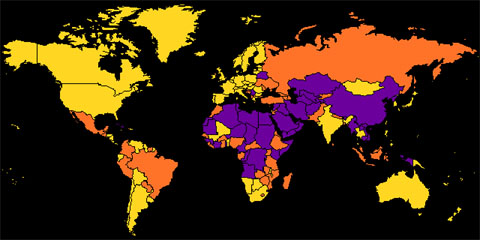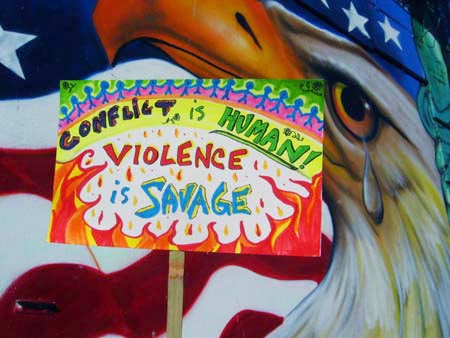Freedom
had a good year
by Joshua Muravchik 24 December 2005 in the LA
Times
Although last week's Iraqi elections boost the prospects for democracy
in that long-suffering land, a new report on the state of freedom
globally gives hope that we are at the start of a tectonic shift
toward liberty across the Muslim world.
The report comes from Freedom House, a nonpartisan organization
founded by Eleanor Roosevelt and Wendell Wilkie. Every year its
specialists rate every country in the world on an exhaustive checklist
of civil and political rights.
These painstaking assessments offer scholars — and the interested
public — a reliable body of data for comparing countries to
each other or to their own past performances. When it has tied certain
U.S. aid to human rights performance, Congress has used the Freedom
House ratings as a benchmark.
Nothing in social or political science is exactly "scientific."
But for measuring freedom, these surveys are as good as it gets.
This week, Freedom House released its survey for 2005. The survey
grades each country (from a best of 1 to a worst of 7) and then
simplifies these scores into a broader categorization of "free,"
"partly free" or "not free." (For example, the
U.S. and Australia are "free"; Burma and Cuba are "not
free"; Turkey and Nigeria are "partly free.") Because
countries usually evolve gradually, not many of the numeric scores
change in any one year, and even a rise or fall in a country's score
is usually insufficient to move it from one of the three broad categories
to another.
This year, however, more countries than usual changed category.
Eight countries plus the Palestinian Authority, not yet officially
a country, moved up — either from "not free" to
"partly free" or from "partly free" to "free."
Four countries moved down. In all, this made it a good year for
freedom.
But here's the really interesting part. Of the nine countries that
improved their ratings, no fewer than six are Muslim countries.
Indonesia moved from "partly free" to "free,"
while Afghanistan, Kyrgyzstan, Lebanon, Mauritania and the Palestinian
Authority moved from "not free" to "partly free."
Of the four countries that became less free in 2005, none was a
Muslim country.
To anyone who has followed the Freedom House data year to year,
these changes are remarkable. Since the fall of Portugal's military
dictatorship in 1974, a tide of freedom and democracy has washed
over the globe. Every region has recorded strong gains, including
even such a poor and troubled area as sub-Saharan Africa and the
socially mutilated lands of the former Soviet empire. But until
this year, the Muslim world had remained a stubborn exception.
In 2001, Freedom House first highlighted this remarkable disparity.
Of the 47 countries that had Muslim majorities, only one was "free,"
18 were "partly free" and 28 were "not free."
Among the non-Muslim countries, the proportions were nearly the
opposite: 85 were "free," 40 "partly free" and
only 20 "not free." Worse, the Muslim world was growing
more repressive, not more free.
Some of the credit for reversing this belongs to President Bush's
strategy of promoting freedom and democracy, including by means
of war in Iraq. Saad Edin Ibrahim, the dean of Egyptian dissidents
and an opponent of the war in Iraq, said recently that it had "unfrozen
the Middle East just as Napoleon's 1798 expedition did."
There is still plenty to debate about the war. And success in Iraq
remains far from assured. Despite progress, Freedom House still
counts Iraq as "not free" as of the end of November.
On the other hand, we must not allow our divisions over Iraq to
blind us to the trend toward freedom. We ought to notice it, applaud
it and do everything we can to encourage it further.
|

